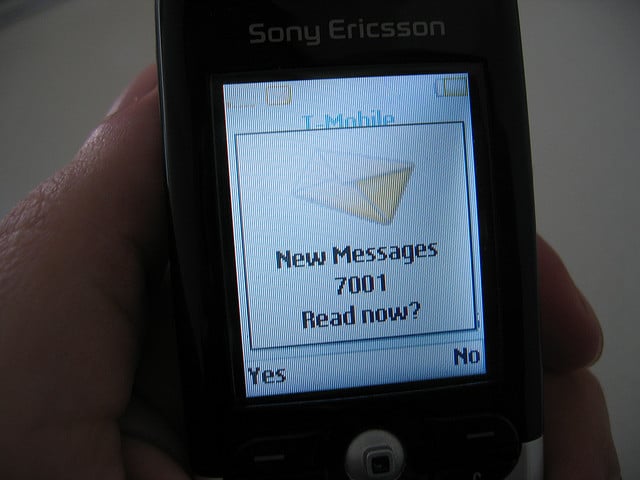
Rules For Debt Collectors
The Fair Debt Collection Practices Act
The Fair Debt Collection Practices Act (FDCPA) sets out the rules for how debt collectors can contact you. For example, they can’t harass you late at night and they have to send you unmarked letters. They have to disclose the fact that they are debt collectors and cannot make false statements. These protections are very important for consumers, but the FDCPA went into effect in 1977 and has not been amended to address technological advances such as text messaging.
Earlier in 2015, the Federal Trade Commission (FTC) began its Messaging for Money initiative when it brought suit in New York and Georgia against three debt collection operations – Unified Global Group, Premier Debt Acquisitions, and the Primary Group – alleging, among other things, violations of the FDCPA. The FTC pointed out that the debt collectors were sending multiple text messages to consumers that failed to disclose they were debt collectors and threatened consumers with false statements. The federal courts in New York and Georgia have temporarily shut down operation of these debt collection companies for sending illegal text messages, emails, and phone calls. The FTC is working to permanently end their operations. Accordingly, despite lacking specific language covering text messaging by debt collectors, the FDCPA may apply to text messages, at least in certain jurisdictions.
The Telephone Consumer Protection Act
There are other regulations and statutes that could also be used to fight those annoying and harassing text messages. Under the Telephone Consumer Protection Act of 1991 (TCPA), you might have a good argument for unlawful activity. Congress passed the TCPA, 47 U.S.C. § 227, et seq. to (1) reduce the number of “random” solicitation calls responsible for tying up private and business phone lines and faxes ; (2) to prevent harassing and repetitive telemarketing calls and “blast” faxes that rose to the level of an invasion of privacy; and to eliminate the imposition of non-consensual costs of the calls and faxes to recipients who had no prior relationship with the caller/advertiser. The TCPA prohibits using autodialing and unsolicited telephone communications without “prior express consent.” In other words, you may not be contacted by phone unless you agree, usually in writing, beforehand. New FCC rules have expanded the protections against autodialing and unsolicited telephone communications to include calls and text messages to cell phones and prerecorded calls to landlines. Violation of the TCPA can result in statutory fines of at least $500 per violation, without a cap. See 47 U.S.C. § 227(b)(3).
Debt collection and creditor calls were not initially contemplated under the TCPA; it was directed to advertisers and solicitors. However, the Federal Communications Commission (FCC) and reviewing courts have subsequently modified the act to find it applicable, in certain circumstances, to debt collection. To prove a TCPA violation against a debt collector you must show the following:
1) That a call was made to a mobile phone by either an automatic telephone dialing system (ATDS) or that an artificial or pre-recorded message was left;
2) That the call was made without the prior express consent of the recipient; and
3) That the recipient was charged for the call (only applicable to “other” services, not mobile phones);
California Case Law
Californians can rely on a fairly recent decision of the Ninth Circuit Court of Appeals to support the argument that a debt collector’s text is a violation of the TCPA. In 2009, the Ninth Circuit Court of Appeals held in Satterfield v. Simon and Schuster that 1) a text message to a cellular phone is a “call” for TCPA purposes; 2) ATDS equipment need only have the capacity to store or produce numbers to be called using random or sequential number generation, whether the system is actually used in that way; and 3) express consent can be extended from a principal to an agent (though there was no such relationship between Simon & Schuster, Inc. and nextones.com). Therefore, if you can meet the minimum requirements set out above for showing that the debt collector violated the TCPA and you can pass the requisite three prong test set out by the court in Satterfield, you have a strong case against a debt collector for violations under the TCPA.
In 2013, the FTC brought suit in federal court against a Glendale, California-based debt collection company and its subsidiaries. The lawsuit, filed in California federal district court, charged the defendants with violating the FDCPA as well as the FTC Act by illegally failing to disclose they were debt collectors and instead, unlawfully holding themselves out as law firms in their text messages, phone calls, and emails. The defendants ultimately agreed to pay a $1 million settlement, establishing a precedent for prohibiting certain types of debt collection via text message.
We Can Help
If you believe that you have been the victim of unlawful text or other communication by debt collectors, we can help you defend your rights. Keep a copy of the text messages you receive and document any other communications you receive from the debt collector or its representative. Then contact us for a free case evaluation and consultation with one of our experienced local attorneys. We can help you determine if your rights have been violated and guide you through your legal options. You may also choose to file a complaint with the FTC and the Consumer Financial Protection Bureau (CPFB) so they can open an investigation into the practices of the debt collection agency.
